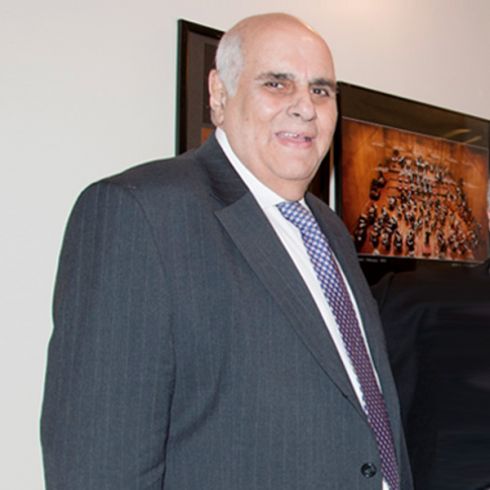
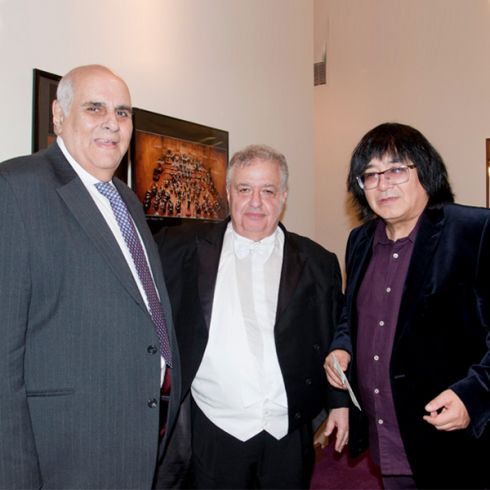
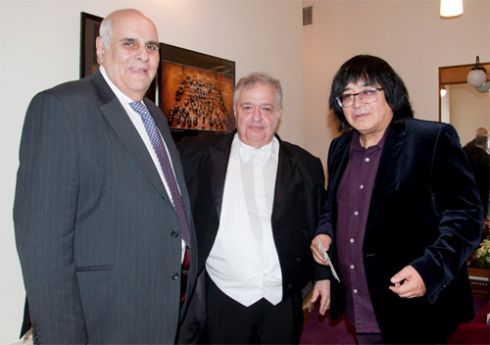
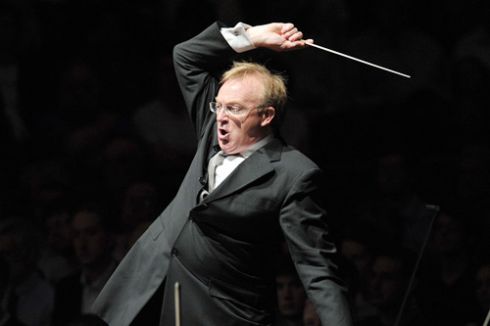
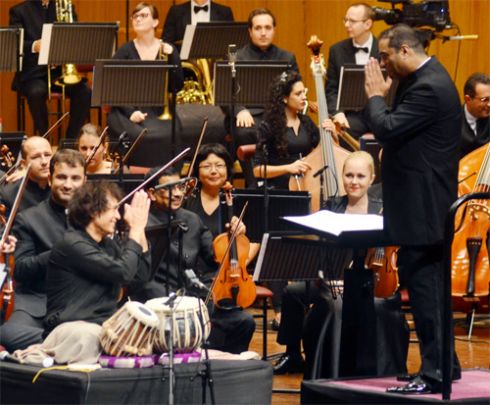
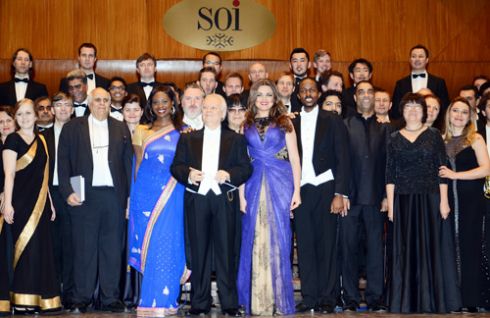
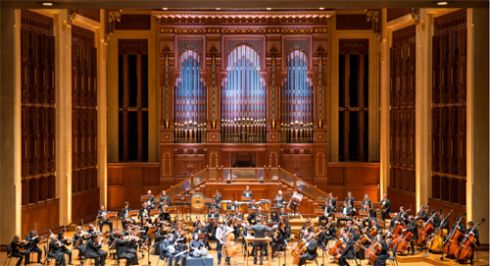
MUMBAI: The early years of the Symphony Orchestra of India, Khushroo Suntook remembers, projected a similar effect as the Indian Premier League (IPL). The chairman of India's most celebrated existing performing arts venue, Santook relies on trendier, popular and far more relevant examples as analogies to help understand the challenges faced and the approaches implemented to overcome them.
India's only and first professional orchestra is celebrating its tenth anniversary this month, and its journey to the milestone has performed an immensely grand role in NCPA’s history.
NCPA opened September with a reason to celebrate. Leading orchestra conductor Martyn Brabbins, joined by violinist Kristóf Baráti, performed on 12 September and the British conductor continued his tribute to the anniversary month with a following performance five days later, featuring The Planets. On 22 September, associate music director at SOI, Zane Dalal, executed Mahler’s monumental Symphony No.1 for the first time with the orchestra.
Today, Suntook’s first associate into turning the Orchestra dream into reality – music director Marat Bisengaliev - will lead the orchestra in Sir Edward Eigar’s popular (among the opera circuit) ‘Enigma’ Variations. Concluding the celebration on 30 September through the deserved joint effort of Bisengaliev and Dalal will feature popular works by Bernstein, Bizet, Johann Strauss Jr., and more.
In an interview with Radioandmusic.com's Suhas Thobbi, CEO Khushroo Suntook speaks about the birth of SOI, the lack of knowledge towards the music genre, memorable anecdotes
To be a consistent and unparalleled catalyst towards the growth of ‘western classical music’ in India must really feel special and rewarding. But little know about the venue and entity’s efforts in ensuring so. Can you describe, first, the challenges – awareness, promotions, scouting musicians, building a team, maintaining the standard – faced when it comes to this particular genre of music?
Challenges – After having heard music in Mumbai for over 50 years, the frustration in the quality of music making and the difficulty in improving that, was the first challenge. This was partly overcome by the sheer quality of the premises at the NCPA which were at our disposal for such an undertaking. Now that we have the cricket field, we needed the cricketers and, unfortunately, the ambition to create an international orchestra was difficult with the talent available locally. That was the greatest challenge. Fortuitously, an opportunity arose when I met Marat Bisengaliev and heard his young orchestra play. Having agreed to come to India several times, he finally agreed to think about forming an orchestra for India. This was a great challenge overcome by this offer.
A remit to insist that Indian players should be included, as a major part of the orchestra, was a lesson in not learning from history. After long auditions, only a handful of Indian players were chosen and I had to turn to Marat and some contacts to bring in further international players. Now this is rather like the IPL where our Indian cricketers, playing alongside international players, improved by leaps and bounds and similarly the orchestra became better each year owing to various lessons we learnt in (a) picking the members (b) in allowing sufficient rehearsal times (c) in buying quality instruments (d) creating a management infrastructure, instead of well-meaning amateurs, to run the show. After a few years, the orchestra proved itself worthy of travel and went to play in Moscow. Thereafter it rapidly improved under international artistes, details of which can be found in our magazine ON STAGE and 10 year book. This also describes the journey which is too difficult to pen in a short article.
Would 'tricky' be the right word to describe NCPA’s early days in engaging the audience towards western classical music? And what was the benchmark set to motivate yourself in achieving higher standards?
‘Tricky’ is certainly not the right word to describe it. Careful marketing and promotion and the popularity of classical ballet presented in full costume and sets was a good introduction. As a result of this, the first performances of the ballet ‘Nutcracker’ were sold out, and created a certain buzz about the new venture.
Having had the luxury of listening to great music all over the world for almost 50 years before taking charge of the SOI, I did have an idea of the benchmark and I was certainly not going to compromise on those standards. Unless the opportunity presented itself to support those standards, I was not going to proceed but did in view of the circumstances described above.
In SOI’s decade-long run, how has the audience grown on a yearly basis? SOI has become synonymous with western classical music in India, and although western classical music enthusiasts and music critics acknowledge that, the commercial audience has still not educated itself about the fact. Does it matter to you?
The SOI audiences have certainly increased over the last few years and we have had many sold out performances. Our operas were popular and all of them were sold out for all performances. The questions now remain on challenging audiences to come to unusual works and this has been proven by the huge success of the concert we performed last week when we played a programme of music which many people had not even heard of. What happened at the concert was proof, that, if you give people quality, they respond.
Unfortunately, I have met many young entrepreneurs socially, but I am sorry to say that they have limited knowledge of the finer arts, which shows an insufficient lack of accent on a liberal education. We were fortunate to receive this at the hands of great Jesuit priests who dominated prominent educational institutions in the ‘50s and ‘60s. The business aspect of acquiring wealth has been dominating so much that it has now resulted in a society full of values which, to say the least, are unfortunate.
The recently concluded Martyn Brabbins performance would be a huge honour for NCPA and SOI, for obvious reasons. Would you elaborate on the collaboration and the execution of the same?
To have conductors of the quality of Martyn Brabbins or Charles Dutoit, and many others who have played with the SOI, is a certificate of its artistic reputation. These artistes have expressed delight at the quality of the orchestra and it is down in writing in our magazines and quotations from them, which is documented authentically. The consistent quality of the orchestra and the interest of the musicians make them want to come back year after year.
British conductor Martyn Brabbins in action |
In SOI’s journey, what would be the one aspect you’d take extreme pride in?
Obviously the great performances – too many to recount and the establishment of our Advanced School of Music, which has progressed to great satisfaction together with the establishment of a Chamber Orchestra, now of almost 30 players, which forms the core of the orchestra. It is resident in Mumbai for 11 months of the year, teaches in advanced classes and serves as a centre of musical excellence in the city.
How has Zane Dalal’s elevation (or change in role) from resident conductor to associate music director further helped you in terms of structure, ideology and goals?
The elevation of Zane Dalal’s role from Resident Conductor to Associate Music Director, was well deserved and carefully thought through by the Music Director and myself. He is a fine musician, a great educator and a conductor, who is now growing in stature with every performance. He had a huge success in Switzerland and Abu Dhabi, and recently conducted at the Royal festival hall in London in May.
Zakir Hussain and Zane Dalal |
Pretty sure, you have several fascinating stories related to SOI. Can you share one of those incidents that probably either provide more information on the Orchestra or create more curiosity about SOI?
There are so many stories connected with the progress of the SOI over the years. One of these was of course a huge accident that Marat and I were involved in, while driving home from a concert, a dumper hit my car with such huge force, that the engine crumbled up to the windshield and the airbags fortunately saved us with the force of ejections and fractured our ribs. While we both thought we would die, Marat screamed “my violin, my violin, hope it is safe” (it was on the back seat of the car) and he certainly valued it more than our life.
In your experience, how has the world perceiving what NCPA and SOI has been doing for the universe of western classical music? What’s the highest praise you have received (apart from the consistent audience approval)?
It is embarrassing to detail the praise received by the SOI regarding its performances but they are so well documented that it does not need comment. There are words such as superlatives, excellence, used regularly and if you can get your hands on a copy of the 10 year SOI brochure, you will see what we mean.
When SOI went on its first European tour, a leading Swiss daily La Temps said, “Smetana (Overture to the Bartered Bride) and Bartok (Concerto for Orchestra): This is not necessarily a crowd-pleaser of a tour poster. And a concerto for tabla as the main course before intermission is also not what the season ticket holders are used to. Yet: Victoria Hall was packed to the brim on Thursday evening, and the Geneva audience warmly expressed its delight. It felt the commitment, the enthusiasm, and the discipline of this ensemble, which played with ferocious energy and appetite.”
When SOI performed at Geneva’s Victoria Hall, Bachtrack said, “The orchestra does not show itself unworthy: very cohesive strings, admirable woodwinds, extremely cohesive brass, and very sensitive timpani... The ensemble tackles the different works with extreme composure, and offer a fresh and striking vision of the overture to the Bartered Bride by Smetana, as well as the Concerto for Orchestra by Bartók. The clarinet solo was nuanced, the bassoons delightfully gritty, and the balance between the strings and the winds intact.”
SOI at Royal Opera House, Muscat |
What would you say be the ‘good enough’ reasons for non-western classical music enthusiasts to attend the gala event?
I think most people who probably want to attend the Gala event would be happy with the nature of the programme which is ‘light’ and more importantly for the dinner, which will be ‘heavy’. Also to be seen at this event is becoming fashionable.
NCPA’s recent foray into live EDM gigs has been appreciated by the musicians involved. What has been the feedback from other communities for the same? And where do we see this new experiment heading to?
As far as the experiment to live EDM is concerned, the NCPA has been open to all forms of music but unfortunately the attendance did not justify the enthusiasm.
Is it sane and logical for a western classical music venue in an emerging market like India to hope one day it’d achieve the status of Vienna Opera House or London Opera House? (Not speaking in terms of infrastructure only, but in terms of the global recognition and popularity)
Western classical music is not the national music of India, whereas it is very much the national music of the countries you have described and it receives huge support from its government, institutions, corporations, etc, and, therefore, it would be very difficult to attain the status of these great houses which have been in existence for hundreds of years. As far as quality of music making is concerned, we can assure our audiences that excellence is striven for and achieved.
If you had to describe SOI’s decade long journey in a few words, how would you put it?
If I had to describe it in three words, it would be satisfaction, more satisfaction and delight. There was no indication that the standard attained today would be possible when we started, but team work, particularly that of our Music Director, Associate Music Director and our wonderful Orchestra Manager, Onai, whose sourcing of musicians is immaculate, have played a major role in achieving what we have over the years.